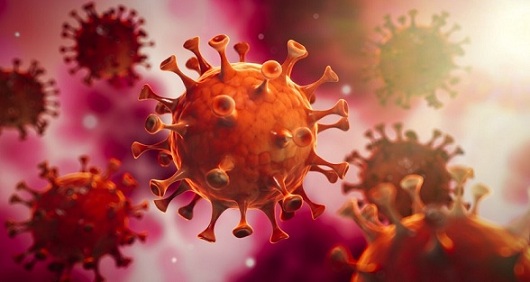Ohio State University Study Finds That Inflammasome CASP4 Causes Disease Severity During SARS-CoV-2 Infection Through Inflammation And Thrombosis
Source: COVID-19 Research Sep 26, 2021 3 years, 6 months, 1 week, 1 day, 11 hours, 9 minutes ago
COVID-19 Research: Day by day newer study findings and data are emerging that gives us a more detailed perspective about the COVID-19 disease caused by the SARS-CoV-2 coronavirus. Some of these findings add to the list of things that we already know while some supersede previous assumptions or weak study findings about the pathogenesis of the SARS-CoV-2 virus and the human host cellular pathway reactions.

Researchers from Ohio State University have in a new study found that the cytokine Caspase 4 or CASP4 also exacerbates disease severity in SARS-CoV-2 infection by promoting inflammation and thrombosis.
Caspase 4 is an enzyme that proteolytically cleaves other proteins at an aspartic acid residue (LEVD-), and belongs to a family of cysteine proteases called caspases. The function of caspase 4 is not fully known, but it is believed to be an inflammatory caspase, along with caspase 1, caspase 5 (and the murine homolog caspase 11), with a role in the immune system.
The study findings were published on a preprint server and are currently being peer reviewed.
https://www.biorxiv.org/content/10.1101/2021.09.24.461743v1
The COVID-19 pandemic caused by the pathogen SARS-CoV-2 is a worldwide health concern, and new treatment strategies are needed.
Targeting inflammatory innate immunity pathways holds therapeutic promise, but effective molecular targets remain elusive.
The study team found that the human caspase-4 (CASP4), and its mouse homologue, caspase-11 (CASP11), are upregulated in SARS-CoV-2 infections, and that CASP4 expression correlates with severity of SARS-CoV-2 infection in humans. SARS-CoV-2-infected Casp11-/- mice were protected from severe weight loss and lung pathology, including blood vessel damage, compared to wild-type (WT) and gasdermin-D knock out (Gsdmd-/-) mice.
GSDMD is a downstream effector of CASP11 and CASP1. Notably, viral titers were similar in the three genotypes. Global transcriptomics of SARS-CoV-2-infected WT, Casp11-/- and Gsdmd-/- lungs identified restrained expression of inflammatory molecules and altered neutrophil gene signatures in Casp11-/- mice.
The study findings confirmed that protein levels of inflammatory mediators IL-1β, IL6, and CXCL1, and neutrophil functions, were reduced in Casp11-/- lungs. Additionally, Casp11-/- lungs accumulated less von Willebrand factor, a marker for endothelial damage, but expressed more Kruppel-Like Factor 2, a transcription factor that maintains vascular integrity.
On the whole, the study findings demonstrate that CASP4/11, promotes detrimental SARS-CoV-2-associated inflammation and coagulopathy, largely independently of GSDMD, identifying CASP4/11 as a promising drug target for treatment and prevention of severe COVID-19.
The
COVID-19 Research study findings suggest that targeting the CASP11 homologue, human CASP4, during COVID-19 will prevent severe pneumonia, inflammation, tissue damage as well as thrombosis and accompanying repercussions
such as low oxygen, lung failure, need for ventilators and perhaps long-term sequela. These advantageous effects will be achieved without compromising viral clearance. It is also plausible that the level of expression of CASP4 could serve as a biomarker to identify patients who will succumb to severe COVID-19. Targeting CASP4 alone can achieve benefits that will exceed and replace the administration of a large number of individual anti-inflammatory agents and anti-thrombotics given to SARS-CoV-2 patients. Further research is needed to develop therapeutics in this regard.
The anti-inflammatory drug indoprofen is an inhibitor of the activity of the caspase-4 enzyme.
https://www.ncbi.nlm.nih.gov/pmc/articles/PMC5357154/
However the drug has been It was withdrawn worldwide in the 1980s after postmarketing reports of severe gastrointestinal bleeding.
Thailand
Medical News instead recommends using the phytochemical Micheliolide, a newly discovered guaianolide sesquiterpene lactone that is extracted from the Michelia compressa and Michelia champaca plants of the Magnolia family. The Michelia champaca plants are extremely common in Thailand and elsewhere in South-East Asia and in India.
Studies have shown that Micheliolide is anti-inflammatory and able to inhibit the Caspase cytokines.
https://www.mdpi.com/1422-0067/22/17/9497
https://atm.amegroups.com/article/view/49285/html
https://www.hindawi.com/journals/mi/2017/2432904/
https://www.dovepress.com/micheliolide-inhibits-liver-cancer-cell-growth-via-inducing-apoptosis--peer-reviewed-fulltext-article-CMAR
https://www.spandidos-publications.com/10.3892/ol.2020.11928
Researchers interested in procuring high grade purified Micheliolide can contact us as Thailand Medical News sister company ie Northern Thai Herbs carries stocks of it along with hundreds of other phytochemicals and herbs.
For the latest
COVID-19 Research, keep on logging to Thailand Medical News.
